|
|
|
Sort Order |
|
|
|
Items / Page
|
|
|
|
|
|
|
| Srl | Item |
| 1 |
ID:
132006
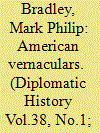

|
|
|
|
|
| Publication |
2014.
|
| Summary/Abstract |
On a wintry January evening in 1973, the members of Amnesty International USA Group 11 gathered on the Upper East Side of New York City to adopt a new prisoner of conscience, Sutanti Adit of Indonesia. Adit, a medical doctor and the wife of the leader of the Indonesian Communist Party, had been arrested and imprisoned in the ruthless campaigns of repression that followed a failed 1965 coup against the Sukarno government, which had ruled Indonesia since its formal independence from Dutch colonial control in 1950. She was among more than a hundred thousand Indonesians arrested, interrogated (often under torture), and imprisoned by the state. As many as fifty thousand of them remained in custody for more than a decade housed in prison camps whose sanitation, medical facilities, and food were inadequate at best. They were permitted very limited contact with the outside world, including family and friends, and harshly mistreated by prison guards.1
|
|
|
|
|
|
|
|
|
|
|
|
|
|
|
|
| 2 |
ID:
132012
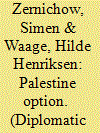

|
|
|
|
|
| Publication |
2014.
|
| Summary/Abstract |
Were the Palestinians anything more than simply a refugee problem? Since the creation of the State of Israel in 1948, the USA had pretty much ignored this haunting question. However, as the Palestinian guerrillas' wide-ranging armed struggle seemed to be approaching a climax in 1970, U.S. policy makers were forced to reassess whether they might also need to view the Palestinian issue as a political problem. In April to May of that year, U.S. State Department officials began to doubt whether the Jordanian regime would survive the civil war then brewing in that country. In response, a strategy paper examining the possibility of a joint Jordanian-Israeli-Palestinian settlement-a policy that would come to be known as the "Palestine" or "Palestinian option"-was developed within the U.S. State Department. Between October and December 1970, the National Security Council discussed various versions of this strategy paper. At the same time, members of the main Palestinian guerrilla organization, Fatah, sent messages to the Americans indicating that they might be willing to enter into negotiations. Why, then, did these efforts fail to bring about a change in U.S. policy toward the Palestinians?
|
|
|
|
|
|
|
|
|
|
|
|
|
|
|
|
| 3 |
ID:
132007


|
|
|
|
|
| Publication |
2014.
|
| Summary/Abstract |
William Eleroy Curtis was central to the creation of the Pan-American movement in the United States. As a lobbyist and bureaucrat, he helped organize the first Inter-American Conference in 1889-1890. As a journalist he became a leading "expert" on Latin America. This article uses Curtis to explore the relationship between Pan-Americanism and empire. Before 1898, Curtis sought only expanded trade, not territory for the United States. However, to explain why the country would "naturally" come to dominate Latin American markets, he depicted Latin Americans as backward yet capable of uplift through the infusion of U.S. knowledge and capital. He thus justified hemispheric control and helped U.S. Americans envision empire as a tutelary imperative. When Curtis supported territorial expansion in 1898 he did so in the language of civilizing mission rather than market aggrandizement. In combining narratives of difference and equality, Pan-Americanism served Curtis as a transitional imperial ideology.
|
|
|
|
|
|
|
|
|
|
|
|
|
|
|
|
| 4 |
ID:
132008
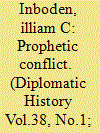

|
|
|
|
|
| Publication |
2014.
|
| Summary/Abstract |
This article traces the development of Reinhold Niebuhr's growing alarm over the rise of Nazi Germany and Imperial Japan leading up to World War II, and his corresponding warnings to the United States and allied powers of the need to confront fascist aggression. The theme of the "prophetic" shaped Niebuhr's perception of the threat of fascism, both through his concern over the religious liberty of Christian and Jewish voices to bring prophetic judgments against totalitarian governments and through his predictions of the threat that fascist regimes posed to the international order. In the course of the 1930s Niebuhr also refined his doctrine of Christian realism, which both influenced yet differed from the evolution of realism as a theory of international relations. Niebuhr's development over this decade also marked his transition from the margins to the center of American intellectual and political life.
|
|
|
|
|
|
|
|
|
|
|
|
|
|
|
|
| 5 |
ID:
132011
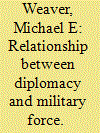

|
|
|
|
|
| Publication |
2014.
|
| Summary/Abstract |
Diplomacy and military force mutually support each other as instruments of national policy, functioning better in concert rather than as separate entities. The Cuban Missile Crisis is a useful case study of policymakers utilizing force and diplomacy synergistically. State Department efforts prior to the crisis paved the way for a unified front with Latin American neighbors against the emplacement of Soviet missiles in Cuba. With a backdrop of nuclear threats supporting the more usable capabilities of conventional air strikes, invasion forces, and blockading ships, the American threat of force made a negotiated settlement attractive to the leadership of the Soviet Union. The risks and political damage commensurate with the use of force encouraged the Kennedy administration to pursue a diplomatic solution. Military leaders tended to not consider the political effects of the use of force. President Kennedy understood the interrelationships between force and diplomacy, as did State Department leaders.
|
|
|
|
|
|
|
|
|
|
|
|
|
|
|
|
| 6 |
ID:
132010


|
|
|
|
|
| Publication |
2014.
|
| Summary/Abstract |
This article discusses U.S. penetration of Greece in 1947-1952, but also the shaping of a more balanced relationship later in the 1950s. Analysis includes both the official, political/strategic relationship, but also the cultural level and the activities of American nongovernmental educational institutions in Greece, an aspect largely ignored by available scholarship. It is argued that the United States was successful because, apart from ensuring the victory of the pro-Western forces in the Greek civil war, it stimulated economic development, transfer of ideas, political change and renovation, and eventually Greece's integration in the hard core of the postwar West. The U.S. experience of Greece, especially during an early phase (the late 1940s), played an important role in the shaping of containment policies, which were not simply anti-Soviet and anti-Communist, and also involved U.S. leadership of an institutionalized, value-oriented West.
|
|
|
|
|
|
|
|
|
|
|
|
|
|
|
|
| 7 |
ID:
132009
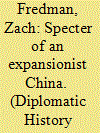

|
|
|
|
|
| Publication |
2014.
|
| Summary/Abstract |
The Chinese Revolution, Korean War, and McCarthyism loomed large over Kennedy administration assessments of Chinese intentions in Vietnam. The president and his advisors disagreed over the exact nature of the Chinese threat, but they uniformly believed in a dangerous, expansionist China. Their assessments promoted cautious escalation in Vietnam, where Kennedy sought to avoid "losing" another Asian country to Communism without provoking another war like Korea. This, in turn, promoted Chinese militancy. Central to Kennedy administration thinking was the idea that Vietnam served as a test case for Beijing's more radical foreign policy line vis-à-vis Moscow. This article traces the development and influence of such assessments. It also argues that the China factor informed Kennedy and Johnson administration notions of credibility. Holding back or reversing Communist gains in Asia by supporting Saigon offered these administrations the chance to kick once and for all the "who lost China" stigma that had haunted the Democratic Party since 1949.
|
|
|
|
|
|
|
|
|
|
|
|
|
|
|
|
|
|
|
|
|